President’s speech: “Rooted in good soil”
Opening convocation speech, as prepared for delivery by President Rebecca Stoltzfus, on Wednesday, Aug. 31, 2022.
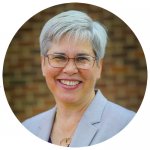
Good morning! And welcome to fall 2022. I couldn’t be happier to be here today with you.
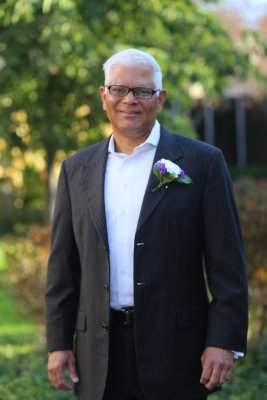
Not quite forty years ago, a young man named Shashi Buluswar came to Goshen College from Calcutta, India, and sat in these very pews. At GC Shashi studied computer science and business – and, he said, he was exposed for the first time to the idea that service can and should be a core tenet of not just education, but of life in general.
After graduating from Goshen College, Shashi earned an MBA and also a Ph.D. in artificial intelligence. He is a scientist, a business strategist and an entrepreneur combating global poverty, fostering peace between India and Pakistan, as well as finding home-grown solutions for local empowerment. Shashi teaches at UC Berkeley, and is the CEO of Global Health Labs, bringing to life breakthrough solutions for combating global poverty.
Shashi’s story demonstrates that when I say “welcome to Goshen College,” I am welcoming you to a community of students, faculty, colleagues and alumni doing outstanding things in the world.
And I’m not exaggerating. Last year a new ranking system of colleges and universities was rolled out to identify schools, regardless of their size, that are using their resources as effectively as possible to help students and faculty achieve their full potential.
Goshen College was ranked number eight in the nation for producing outstandingly achieving alumni for our size and resources – far higher than any college or university conventionally considered ‘elite’ in this country.
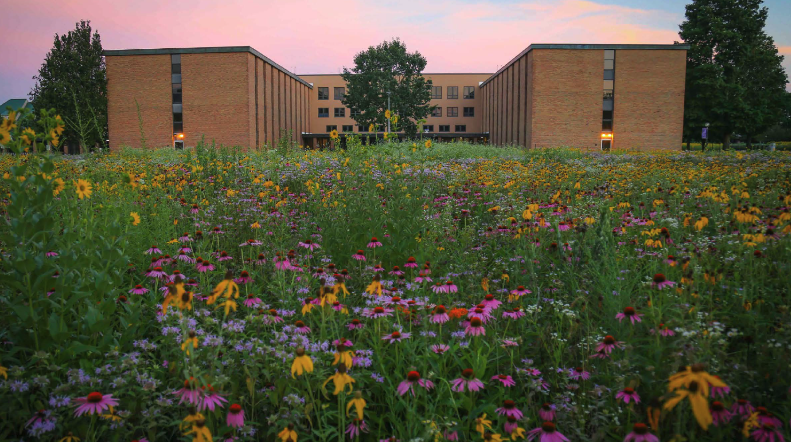
What makes our community so unusually fruitful? Because we are rooted in good soil. We are like a prairie.
This morning I want to think with you about Goshen’s prairies, literally and as a metaphor. You might have noticed that our campus here in Goshen is home to more than ten acres of prairie. That’s a lot, for a campus. Our Merry Lea Environmental Learning Center is home to an additional 94 acres of prairie.
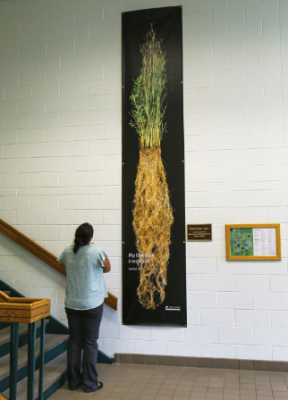
One of the surprising characteristics of prairies are their root systems. This is a photo of a bluestem grass plant, a grass found throughout our prairies. This bluestem grass banner hangs in our Science Building.
There is more prairie underground than above ground! The massive dense root systems of prairies slow the runoff of water after heavy rains, reduce soil erosion, prevent or lessen the severity of flooding, and rebuild the structure of damaged soil.
Prairies are resilient. They are strong and designed to last, because the ecosystem keeps enriching the soil.
Goshen College is also deeply rooted. We are first and foremost rooted in the way of Jesus. We are connected to the Mennonite Church, a lively part of the 500-year-old movement called Anabaptism that aims to put Jesus’s life and teachings at the center of faith and life.
Back in the 1500s, Anabaptists got into a lot of trouble with the church. In contrast to the Roman Catholic Church State operating in Western Europe at that time, these small groups of people asserted that neither the State nor parents could “make” a child Christian through infant baptism. Instead, Anabaptists, including Mennonites today, believe that each person is capable of making a choice of whether or not to follow Jesus.
Because of that, we respect your journey and your choice. Whether you come from another faith tradition, or some variety of Christianity, whether you are Mennonite or are unsure what you believe, if anything! You are welcome here.
It’s not that beliefs don’t matter. They do. But our prairie is expansive. We want to learn to know you and invite you into honest conversations about matters of faith, spirituality and the moral questions of today. Because we are also deeply rooted in community – not just as an idea but as a living practice.
The foundation of our community is the inherent goodness and dignity of each one of us. Each of us bears the image of God, and every one of us deeply beloved and precious.
Like our gathered community this morning, our prairies are diverse. Prairies are made of many different plants with different colors and textures. None of those plants can be a prairie by itself. Prairies are communities.
At Goshen College, our diversity is essential to our community and also our academic excellence. Teaching and learning about diversity and through our diversity connects our academic excellence, real world experience inside and outside the classroom, and active love for God and neighbor.
This entire amazing root system of Goshen College is the source of our faith.
Now when I speak of faith at Goshen College, there’s a lot of things I don’t mean. I don’t mean you have to believe in a particular doctrine, and I don’t mean that you have to believe magical things. Faith is not anti-science, nor is it a list of rules that keep people in and out.
Here’s what I do mean when I talk about faith: The Apostle Paul wrote that faith is the substance of things hoped for, the evidence of things not seen.
Faith is a longing for a truer, more beautiful world – not just the longing but actively imagining it, and talking about it.
And faith in action is not just having the longing but stretching for it. That’s what we are doing here – we’re all stretching for it. Which is very much a team sport.
And I am confident down to the marrow of my bones that there is a powerful force for love in the world that is stretching for all of us, in personal and tangible ways. A force that I and many others call God.
All of those roots, that massive underground goodness, expresses itself in the world. The hidden roots produce the visible prairie.
The colorful blooms and tall grasses, the habitat and shelter, the birds, bats, bees, butterflies, beetles, squirrels and other small mammals that pollinate plants and are thus responsible for our food system.
If GC is like a prairie, the visible expression of our prairie goodness is our core values. Our core values are the expression of our growth; the green blade rising.
Did you know that the English word, grass, comes from an ancient Sanskrit word meaning to grow? That’s what grass does.
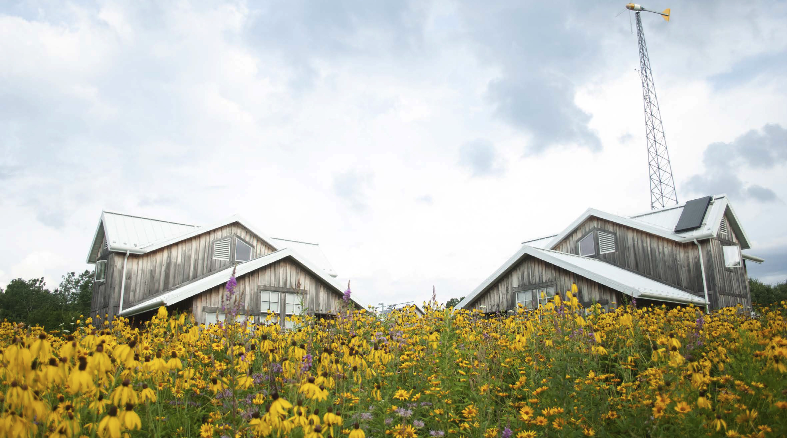
We are here for passionate learning – dreaming of the new things we want to create or bring about, within ourselves and for the world. We study, get together in teams, talk for hours, test hypotheses, practice our skills and are unusually bold in our efforts to make things better.
And this shows up in our core value of Servant Leadership: We take responsibility for seeing the potential in people and processes, and have the creativity and courage to bring that potential into reality.
How did prairies come to be on our campus? Through student leadership. Twelve years ago, a group of students in Professor Jerrell Ross-Richer’s environmental economics class took on the project of researching the process, consequences and return on investment of converting nine acres on campus from lawn or pavement to native prairie systems. GC leaders adopted their proposal.
What is the potential that you want to help bring about?
And at Goshen, we imagine and seek peace. This value arises directly from Jesus’ life and teachings. Our core value of compassionate peacemaking means that we actively learn and practice ways that create peace – for ourselves and for others. We reject violence as a norm, and we recognize how we make choices that promote violence or that promote compassion.
Our peace pole near the Union Building is a visible reminder of our commitment: May peace prevail on earth.
We celebrate peacemaking in our annual Peace Oratorical Contest, hosted by the Communication Department, as well as the Peace Plays produced by our Theater Department. This year’s peace play will be the first theater stage production, on Homecoming Weekend in October. Please come!
Our fourth core value of Global Citizenship means that we have empathy and imagination for the whole world.
Global education is woven throughout our curriculum – not only in our classrooms, but around the world. We learn to see and understand the connections between people, cultures, economies and ourselves. Be adventuresome in your time here.
This year our GC community is from 34 nations, bringing the world into our classrooms with rich cultures and perspectives. And to our DACA and undocumented students, we are glad you are here! We will support you and advocate for your rights.
You are all citizens of this campus community, with full access to security, resources, freedom. You have a voice, and we want you to learn to use it with strength and with compassion.
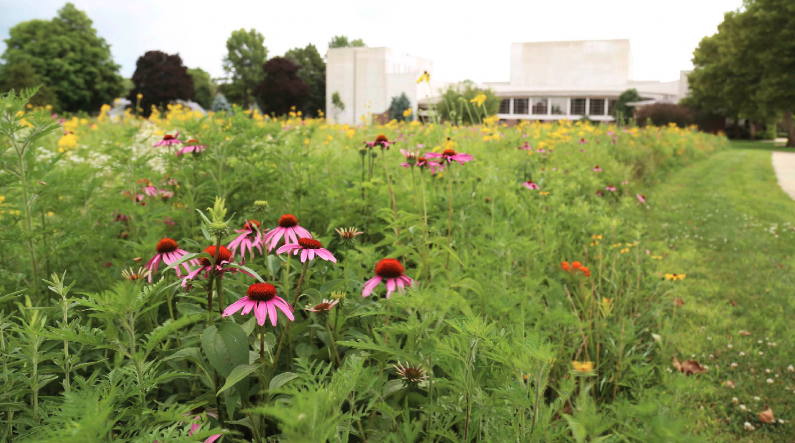
There are two more things I want you to know about the prairies on our campus.
The first is how they connect to the history of this land. Before Goshen College, before the City of Goshen, before English settlers came to this land, it was oak savanna and prairie. Some of the most beautiful, rich, ecologically wonderful land in the region. Known as the Elkhart Prairie, it was one of the traditional homelands of the Potawatomi People.
When the colonial soldier John Jackson encountered this land for the first time he declared it the most beautiful land he had ever seen. During the War of 1812, Jackson and a contingent of U.S. troops marched on the Potawatomi village of Wanyanoshonya, less than 10 miles from our campus, near the present day town of Benton. The native people had fled, but the troops collected any items of value and set fire to the village. Eventually the Potawatomi were forced to leave this region in 1838 in what is known as the Trail of Death.
That painful history is why we begin this year and every year by acknowledging that we gather today on the ancestral land of the Potawatomi people past and present. We honor the land itself and the indigenous people who have lived on and with this Elkhart prairie and savanna throughout the generations. We commit to learning how to be in closer relationship with the land we inhabit, and to relate with respect to the people who were violently displaced from this land.
The second thing I want you to know about our prairies is that they are taking care of us. I mentioned earlier how they help manage water and prevent flooding. In addition, we human beings are burning the carbon stored within the earth and creating a blanket of carbon emissions that is heating our planet and causing weather and water crises around the world. All the while, our prairies are quietly and steadily absorbing carbon dioxide from the atmosphere and restoring it to the earth. Our prairies, along with our trees, are taking care of us.
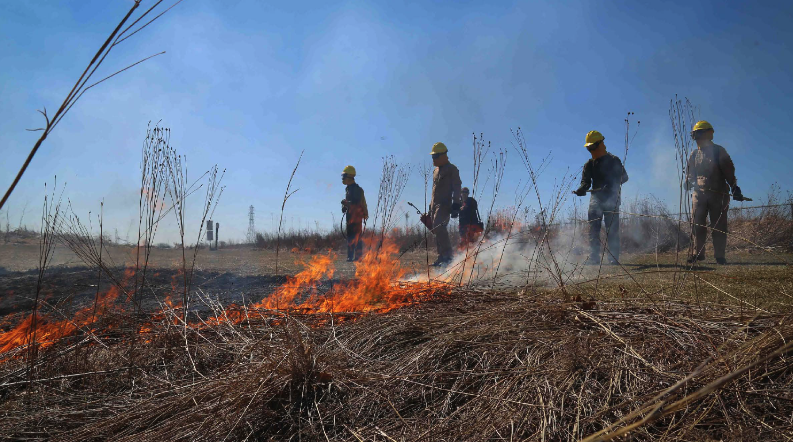
And we take care of them.
Because there are no longer bison or other large mammals to browse them, faculty, staff and students burn the prairies in the spring. Burning puts even more carbon back into the soil, and according to professor Ryan Sensenig, is a lot of fun.
And GC faculty and student researchers are actively studying how prairie ecosystems work. Prairies are still surprising researchers with what professor Jonathon Schramm describes as the dynamic and intricate dance going on every day among plants, their roots, soils, microbes, insects and animals. Be dazzled and be in relationship to this land.
Our new Global Citizenship Award
Goshen College, like a prairie, is an ecosystem that keeps enriching our soil. Our alumni care about you, including Shashi Buluswar, who I talked about at the beginning.
Shashi worked with us last year to establish the Global Citizenship Award, for undergraduate students in their third year of study who represent Goshen College’s Core Values in exceptional ways.
It brings me great pleasure this morning to announce the first three winners of the Global Citizenship Award, who are all seniors at GC this year. The first place awardee receives a $10,000 scholarship, and two runners-up each receive $5,000.
Third-year students were nominated by professors, and each wrote an essay describing how they have experienced or embodied the GC core values. A faculty committee reviewed the nominations and made recommendations to the dean. It was a hard choice, and I want to commend every student who applied.
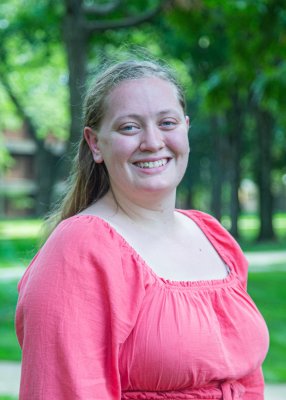
The first of two runners-up, who will receive a $5,000 scholarship is Cadence Lee. Cadence is a music and education double major from Elkhart, Indiana, nominated by Kathy Meyer Reimer, professor of education. You may recognize Cadence from Parables worship ensemble, Voices of the Earth Choir, or from last spring’s musical, Putnam County Spelling Bee. If you’ve taken a class with her, you may have experienced her generosity and leadership skills in academic settings. Cadence wrote: “my current definition of my faith has been changing ever since I stepped foot on Goshen’s campus. I have been able to develop my concept of faith and experience a cohesiveness between my previous faith and the inclusive measures that my old faith was missing. I can be myself.” Cadence is back on campus this fall after spending the summer on SST in Ecuador. Congratulations, Cadence!
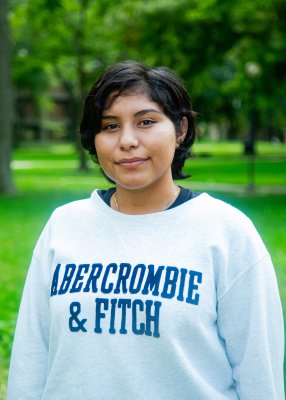
The second runner up, also receiving a $5,000 scholarship is Giovana Gaona. Giovana is a public health major from Elkhart, Indiana, nominated by Brianne Brenneman, assistant professor of public health. Giovana is known for her empathy, curiosity, and community-orientation. A significant part of Giovana’s identity has been shaped by becoming a mother at a young age. She is genuinely interested in always learning: whether that be about a certain topic or about the beliefs, values, and perspectives of her classmates. Giovanna traveled this summer to the Texas border in an SST course on refugees and immigration. She wrote: “this subject is one that hits close to home and that I got to experience from my own family; however, this course is helping me define what global citizenship means in terms of all of humanity.” Congratulations, Giovana!
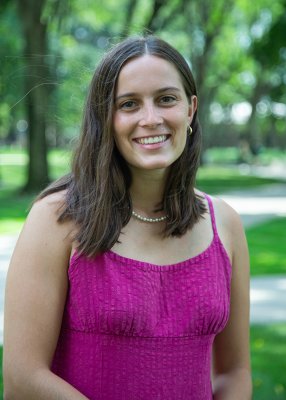
And the first ever recipient of the $10,000 Global Citizenship Award is Suzanna Yoder, nominated by Jeanne Liechty, professor of social work. You might recognize Suzanna from the basketball court, or in her academic role as a social work major. From Wellman, Iowa, Suzanna spent the summer on SST in Senegal. Suzanna wrote: “From my time at Goshen, I have learned how to think critically. I have learned to question things that seem simple and obvious. I have always been someone to ask questions, but I haven’t always viewed this as a good thing. However, my professors at Goshen have encouraged my questions, and I’ve learned that curiosity leads to rich learning.” Suzanna is unafraid to ask questions when she doesn’t understand a concept. Both her professors and her peers appreciate this, because it helps everyone engage more deeply and effectively in learning. Congratulations, Suzanna!
Congratulations to all three of you.
And to each and every one of you: Welcome to this prairie. The soil is good. Put down some roots. Grow and flourish. I can’t wait to see how your fruitfulness reveals itself in this community and in the world.




